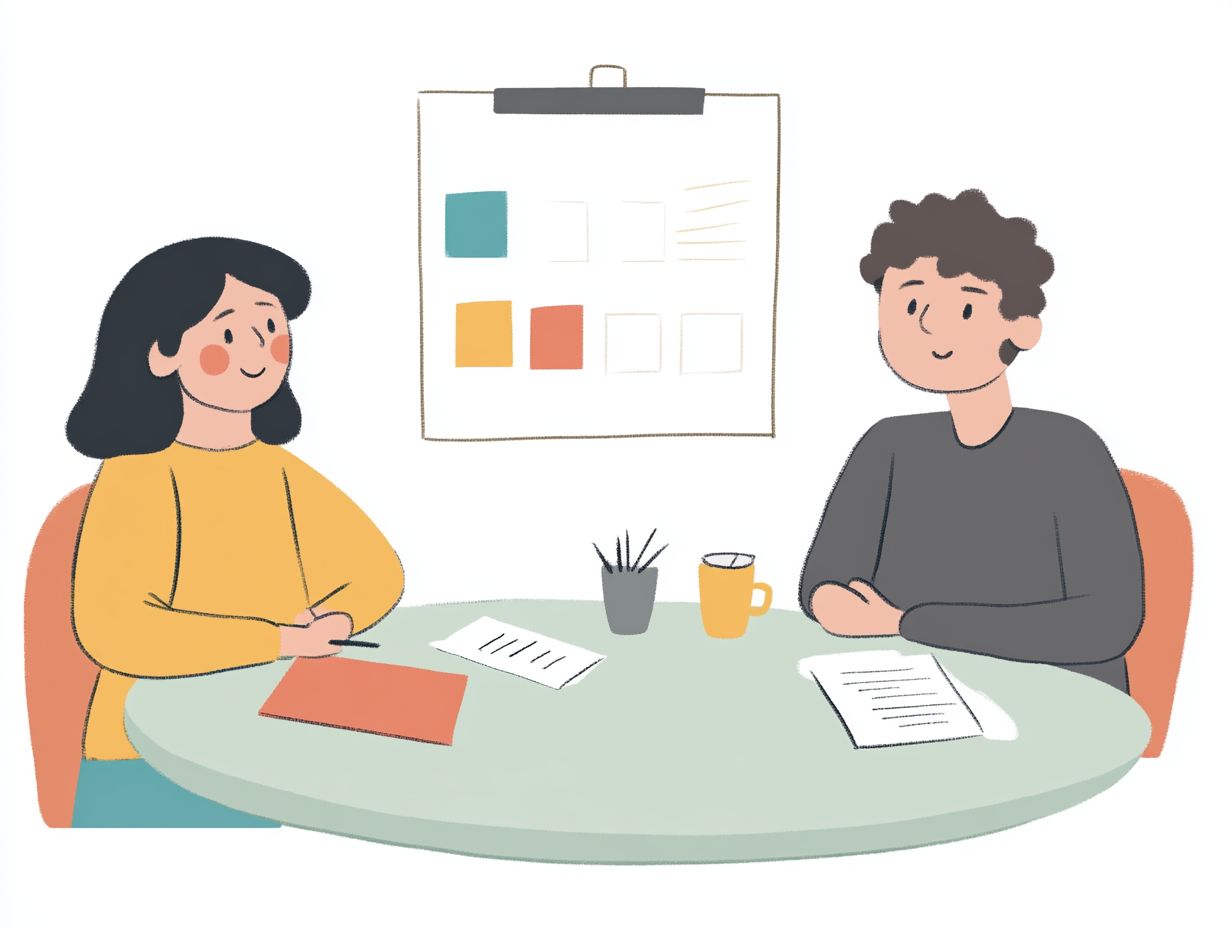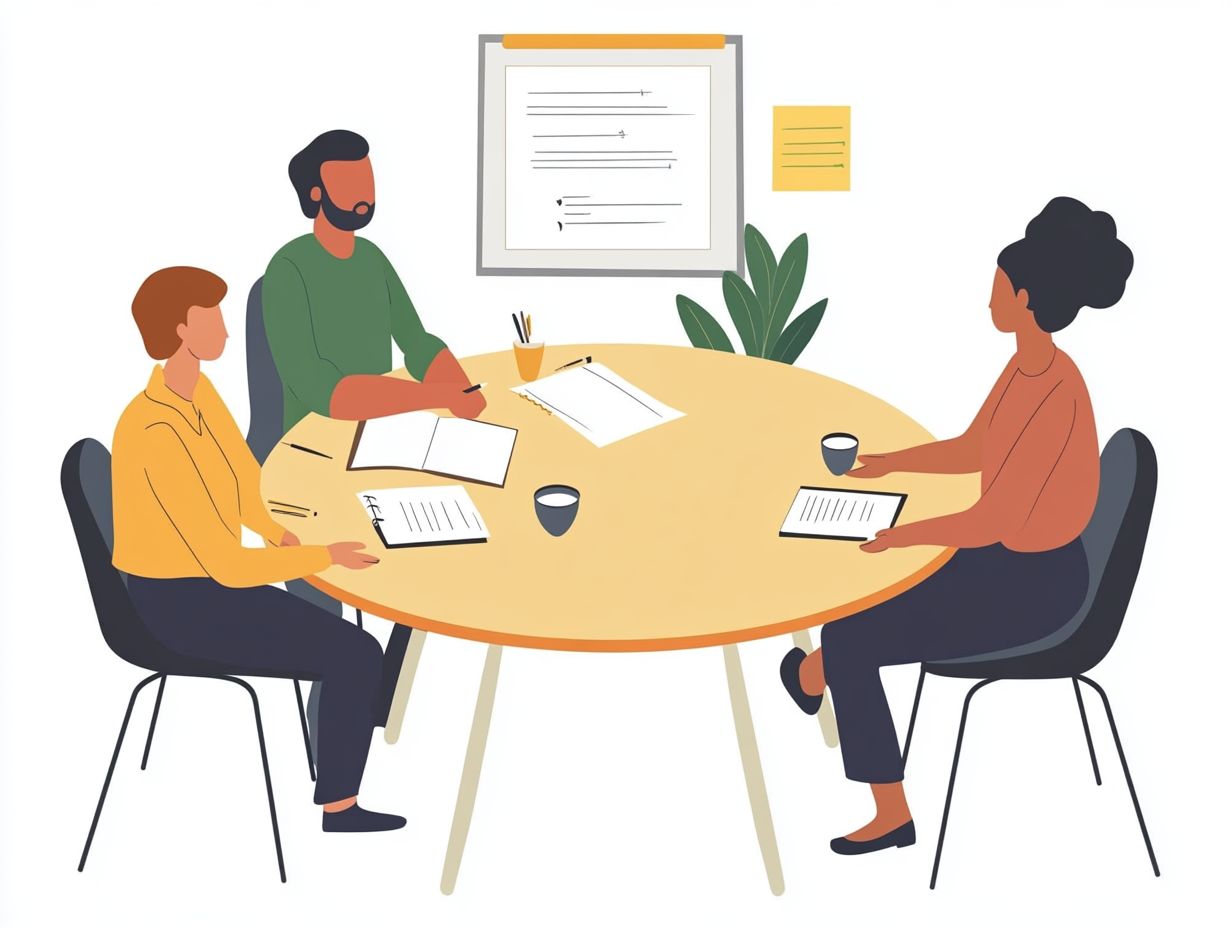Essential Questions to Ask During Negotiations
Negotiation is an art form that demands meticulous planning, clear communication, and a profound understanding of the needs of both parties involved. To maneuver through this intricate landscape effectively, you must ask the right questions.
This article delves into the primary objectives of negotiations, the key issues you need to resolve, and the potential solutions at your disposal. It also highlights the priorities for both sides, the consequences of failing to reach an agreement, and the resources available to you.
Whether you re a seasoned negotiator or just stepping into the arena, these insights will empower you to achieve more favorable outcomes.
Contents
- Key Takeaways:
- 1. What Are the Main Objectives of the Negotiation?
- 2. What Are the Key Issues That Need to Be Resolved?
- 3. What Are the Priorities for Both Parties?
- 4. What Are the Potential Solutions to the Issues?
- 5. What Are the Consequences of Not Reaching an Agreement?
- 6. What Are the Available Resources for Both Parties?
- 7. What Are the Timelines for the Negotiation Process?
- 8. What Are the Potential Barriers to Reaching an Agreement?
- 9. What Are the Non-Negotiable Points for Both Parties?
- 10. What Are the Possible Compromises?
- How Can Effective Negotiations Benefit Both Parties?
- What Are the Common Mistakes to Avoid During Negotiations?
- How Can a Neutral Third Party Facilitate the Negotiation Process?
- What Are the Different Styles of Negotiation and When Should They Be Used?
- How Can Cultural Differences Impact Negotiations?
- What Are the Key Components of a Successful Negotiation Strategy?
- Frequently Asked Questions
- What are some essential questions to ask during negotiations?
- Why is it important to ask questions during negotiations?
- What types of questions should I avoid asking during negotiations?
- How can I use questions to my advantage during negotiations?
- Should I prepare a list of questions beforehand?
- What if the other party refuses to answer my questions?
Key Takeaways:

- Define clear goals for both parties to ensure success.
- Consider barriers and non-negotiables to avoid mistakes.
- Utilize open communication and different styles for effective negotiations.
1. What Are the Main Objectives of the Negotiation?
The primary objectives of negotiation center around achieving a mutual agreement that satisfies everyone’s interests. This fosters collaboration and compromise through effective communication skills. These objectives are essential for ensuring successful outcomes, especially in high-stakes business negotiations where the stakes can be significant just consider leaders like Mark Cuban and firms like The Maker Group.
In these cases, it s vital to understand specific negotiation goals, such as financial terms, contract agreements, and relationship building. For instance, when a tech company negotiates a licensing deal, they can’t just focus on securing favorable financial terms; they also need to create a partnership that paves the way for future collaborations.
By taking the time to grasp the other party s perspective, you can tailor your strategies to address their concerns effectively. Mastering this skill can transform your negotiation experience! Those who excel in negotiation can manage challenges, ensuring both immediate and long-term objectives are achieved while maintaining strong professional relationships.
2. What Are the Key Issues That Need to Be Resolved?
Identifying the key issues that require resolution is essential in your negotiation process. These often encompass significant concerns such as data security, emotional resistance, and differing perspectives that could hinder your progress.
Managing these challenges demands a keen awareness of not only your own objectives but also the motivations of the other party. Recognizing these critical factors creates a more conducive environment for dialogue.
Active listening plays a pivotal role; it enables you to understand not just the spoken words but also the emotions and intentions behind them. Coupling this with the art of asking effective questions uncovers underlying concerns that may not be immediately visible.
This approach builds trust and excitement, laying the groundwork for collaborative problem-solving. Ultimately, this leads to more meaningful and satisfactory agreements for both parties involved.
3. What Are the Priorities for Both Parties?
Understanding the priorities of both parties is essential to the negotiation process. This understanding lays the groundwork for collaboration and potential compromises that can yield a successful agreement.
By recognizing what each side values most whether it’s financial incentives, work-life balance, or long-term partnerships you can craft a shared vision that addresses immediate needs while setting the stage for enduring relationships.
To effectively pinpoint these priorities, engaging in active listening and asking open-ended questions are critical strategies. This method helps uncover underlying interests that might not be immediately visible, allowing you to explore alternative solutions that satisfy both sides.
Addressing these priorities leads to outcomes where both parties feel valued and understood. This creates an atmosphere where collaboration flourishes well beyond the negotiation table.
4. What Are the Potential Solutions to the Issues?
Finding solutions is key to successful negotiations. It enables you to implement various strategies tailored to the unique challenges faced by both parties.
During this exploratory phase, a variety of solutions can emerge. This includes creative problem-solving methods that encourage out-of-the-box thinking and compromise options that foster cooperation.
By actively gathering information and asking in-depth questions, you can uncover the underlying interests and needs of everyone involved. This paves the way for solutions that may not have been immediately apparent.
This approach builds teamwork and enhances trust among the parties. The result is more sustainable and effective outcomes.
Your flexibility and open-mindedness in this process can transform challenging conflicts into productive negotiations.
5. What Are the Consequences of Not Reaching an Agreement?
The consequences of failing to reach an agreement during negotiations can be significant. This may lead to potential barriers, strained relationships, and lost opportunities for everyone involved.
When unresolved issues linger, residual tension can create hurdles for future interactions. You may find yourself stuck in entrenched positions, fostering distrust and complicating any subsequent dealings.
Essentially, the seeds of conflict sown during failed negotiations can grow into lasting animosities. These can undermine not just business relationships but also the potential for successful project outcomes.
To navigate these challenges, establishing trust is crucial. Trust serves as the foundation for open communication and a willingness to explore compromise. This ultimately guides negotiations toward more fruitful resolutions.
6. What Are the Available Resources for Both Parties?

Identifying the available resources for both parties is essential in the negotiation process. This includes negotiation consultancy services, training programs, and tools for enhancing data security, all of which empower everyone involved.
These resources provide invaluable insights and equip you with strategies that can lead to favorable outcomes. Workshops and training seminars are key in this transformation, offering hands-on experience and expert guidance.
By attending these sessions, you learn techniques for effective communication, deciphering body language, and mastering the art of persuasion. Such programs encourage collaborative problem-solving and deepen your understanding of the other party’s interests.
As you sharpen your skills through these structured learning opportunities, you ll notice a boost in your confidence and competence. This significantly enhances the overall negotiation experience.
7. What Are the Timelines for the Negotiation Process?
Establish clear timelines for the negotiation process. This keeps everyone focused and aligned on both the negotiation dynamics and overall business objectives.
When you have a defined deadline, you can strategically plan your approach. This allows you to concentrate on key issues without getting bogged down by unnecessary delays.
This clarity also reduces the risk of misunderstandings, creating an atmosphere conducive to collaboration.
The pressure of time can significantly influence decision-making. It often results in hasty conclusions that do not serve the best interests of all parties.
By recognizing how time constraints affect decision-making, you can develop strategies that respect deadlines while prioritizing thoughtful and informed outcomes.
8. What Are the Potential Barriers to Reaching an Agreement?
Understanding barriers in negotiations is crucial. These challenges may arise from emotional resistance, miscommunication, or differing techniques.
Biases can cloud judgment, leading to assumptions that hinder collaboration. When trust is lacking, critical information may not be shared, stalling progress.
Emotional dynamics like frustration can create conflict. To navigate these obstacles, using active listening can significantly improve the situation.
Engaging with the other party fosters respect. This paves the way for open dialogue and strengthens the foundation for an agreement.
9. What Are the Non-Negotiable Points for Both Parties?
Identifying the non-negotiable points for both parties is essential. These key points form the core of your negotiation interests, and compromising on them can lead to significant repercussions.
By clearly defining crucial contractual clauses such as payment terms, delivery schedules, or confidentiality agreements you create a strong foundation for collaboration.
Upholding ethical standards like transparency and honesty cultivates trust and ensures a positive working relationship.
When you and the other party clarify your must-haves early on, misunderstandings are greatly diminished. This proactive approach streamlines negotiations and fosters mutual respect, vital for long-term partnerships.
10. What Are the Possible Compromises?
Dive into exploring potential compromises; it s crucial for your negotiation success! It allows both parties to identify a middle ground that addresses core interests while fostering collaboration.
This dynamic approach leads to creative solutions and the flexibility necessary for achieving the best results.
For instance, consider a recent negotiation in your workplace where two teams with conflicting project deadlines aligned their schedules by proposing staggered timelines, enabling phase-wise completion.
In real estate, buyers and sellers often thrive by negotiating not only on price but also on additional terms such as closing costs or repair allowances.
These scenarios demonstrate how thinking outside the box can lead to mutually satisfying agreements, ultimately strengthening partnerships.
How Can Effective Negotiations Benefit Both Parties?
Effective negotiations can bring remarkable benefits for all involved, creating agreements that enhance collaboration and strengthen relationships.
By honing your communication skills, you can articulate needs and concerns with clarity, paving the way for deeper understanding. This process naturally builds trust and fosters an environment of open dialogue.
Imagine a tech firm negotiating a partnership with a startup; their transparent discussions allowed them to forge a long-term relationship, sparking innovative product developments that benefited both parties.
Such successful negotiations show that cultivating cooperation yields immediate results while laying the groundwork for future ventures. It reinforces the idea that effective negotiation transcends mere transactions it s about nurturing ongoing relationships.
What Are the Common Mistakes to Avoid During Negotiations?

During negotiations, it’s easy to make common mistakes that can derail progress. Letting emotions get the best of you, failing to ask the right questions, or overlooking crucial techniques can all lead to poor outcomes.
Poor communication breeds misunderstandings. If you’re not well-prepared, you might miss out on golden opportunities for advantageous agreements. Being rigid can limit your ability to change as discussions evolve, ultimately deterring potential compromises.
To sidestep these pitfalls, listen actively to make everyone feel valued. Take the time to prepare thoroughly by outlining key points and anticipating possible objections. This preparation can significantly enhance your readiness.
Maintaining a flexible mindset opens the door to creative solutions that benefit all parties, boosting the chances of a favorable outcome.
How Can a Neutral Third Party Facilitate the Negotiation Process?
A neutral third party can be crucial in facilitating the negotiation process by mediating discussions, reducing emotional resistance, and promoting open communication between conflicting parties.
By creating a collaborative environment, this unbiased facilitator builds trust among participants. It encourages them to express their concerns and interests freely. This approach is especially beneficial in high-stakes negotiations, where tension often obstructs constructive dialogue.
In these situations, the third party offers valuable insights. They guide you to concentrate on shared goals rather than personal grievances. When an impartial observer is involved, employing effective negotiation techniques becomes significantly smoother. They can pinpoint miscommunications, highlight areas of agreement, and propose alternative solutions, ultimately boosting the likelihood of a successful outcome.
What Are the Different Styles of Negotiation and When Should They Be Used?
Different styles of negotiation can profoundly influence your process. Techniques such as competitive, collaborative, and compromising approaches should be utilized based on the context and desired outcomes.
Each style brings distinct advantages. For instance, a competitive strategy might serve you well when you’re in a position of strength, allowing you to secure the best deal without the added weight of relationship concerns.
A collaborative approach truly shines in situations where long-term relationships matter. It prioritizes the interests of all parties, fostering trust and open communication.
There’s also the compromising style, which can be essential when time is tight or when both parties hold similar power and are ready to make concessions.
By adjusting your negotiation style to suit these varied situations, you can enhance the dynamics of your discussions, leading to outcomes that are not only satisfactory but also sustainable.
How Can Cultural Differences Impact Negotiations?
Cultural differences carry considerable weight in negotiations, influencing communication styles, dynamics, and the entire process. Understanding these differences isn’t just helpful it’s essential for your success!
For instance, some cultures lean towards indirect communication, prompting you to read between the lines and interpret non-verbal cues. Others value directness and clarity to express their positions.
Values like collectivism the practice of prioritizing group needs over individual desires versus individualism also play a significant role in shaping decision-making processes. Some cultures prioritize group consensus over individual opinions.
To navigate these complexities with finesse, invest time in understanding your counterpart’s cultural background. This insight can reveal their negotiation preferences.
By listening actively and demonstrating adaptability, you’ll create a more open dialogue, paving the way for successful outcomes.
What Are the Key Components of a Successful Negotiation Strategy?
A successful negotiation strategy consists of several key components: effective communication skills, trust-building, and the ability to change tactics for favorable outcomes.
Effective communication goes beyond stating your position; it involves active listening and a genuine effort to understand the other party’s needs. This includes practicing reflective listening techniques, which clarify points and demonstrate empathy.
Trust-building is vital. Establishing rapport can significantly influence the negotiation atmosphere. You can foster trust by being transparent about your intentions and honoring your commitments throughout the process.
Flexibility in your negotiation tactics is crucial, especially when unexpected challenges arise. By maintaining a flexible mindset and adjusting your strategies based on real-time feedback, you can navigate complex discussions effectively and align with the diverse interests of all parties involved.
This approach drives you to secure agreements that truly benefit everyone involved!
Frequently Asked Questions
What are some essential questions to ask during negotiations?

1. What are the key goals for both sides in this negotiation? 2. What potential roadblocks or concerns may arise during the negotiation? 3. Can you explain your reasoning behind your initial offer or counteroffer? 4. Are there specific timelines or deadlines to consider? 5. Can we explore flexibility in the terms being negotiated? 6. How will we measure the success of this negotiation? For a deeper understanding, consider the best questions to ask during negotiation.
Why is it important to ask questions during negotiations?
Asking questions allows for a better understanding of the other party’s needs, concerns, and motivations. It clarifies misunderstandings and ensures that both parties are aligned. Questions can also lead to potential compromises and mutually beneficial solutions.
What types of questions should I avoid asking during negotiations?
Avoid questions that are too personal or aggressive, as they can create tension and hinder the negotiation process. Also, steer clear of closed-ended questions that only require a yes or no answer. Instead, ask open-ended questions that encourage dialogue.
How can I use questions to my advantage during negotiations?
By asking strategic questions, you can gather valuable information and insights that help you make informed decisions. Questions also steer the conversation toward your desired outcome and allow you to better understand the other party’s perspective.
Should I prepare a list of questions beforehand?
Yes, it’s wise to prepare a list of essential questions before negotiations. This ensures you cover all necessary topics and stay focused. However, be ready to adapt if new information or situations arise during the process.
What if the other party refuses to answer my questions?
If the other party refuses to answer, try to understand their reasoning and address any concerns they may have. If they still refuse, it could signal that the negotiation isn’t going well. In such cases, it may be best to take a break or end the negotiation.






